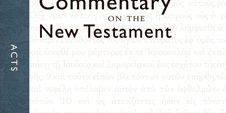
Book Notes: New Testament Commentaries
By Matthew Barrett–
Eckhard J. Schnabel. Acts (Zondervan Exegetical Commentary on the New Testament). Grand Rapids: Zondervan, 2012.
In this nearly 1200 page commentary, Eckhard J. Schnabel introduces readers to the early church and the ministry of the apostle Paul in the book of Acts. Each chapter begins by describing the literary context, the main idea, as well as the structure and literary form, not to mention a detailed exegetical outline. Here are some of the highlights in the book:
1. the work of God through the exalted Jesus who grants the presence of the Holy Spirit
2. the significance of Jesus who is Israel’s Messiah and the Savior of the world and who directs the expansion of the church
3. the work of the Holy Spirit as transforming power present in the lives of the followers of Jesus and their communities
4. the identity of the church as the community of God, comprised of Jews and Gentiles who are followers of Jesus
5. the mission of the church whose leaders take the gospel to cities and regions of the Roman Empire in which Jesus has not yet been proclaimed as Messiah and Savior
6. the historical events and the persons who played a role in the expansion of earliest Christianity.
Craig S. Keener. Acts: An Exegetical Commentary: Introduction and 1:1-2:47. Volume 1. Grand Rapids: Baker Academic, 2011.
If you thought Schnabel’s 1200 page commentary was massive, think again. Baker has recently published Keener’s commentary on Acts and volume 1, which only covers Acts 1-2:47, is over 900 pages. He spends the first 600 pages just introducing the book of Acts. I do not expect to agree with Keener on a number of issues (e.g., egalitarianism vs. complimentarianism), nonetheless, I anticipate that this commentary and the future volumes to come will be significant discussion starters on the book of Acts.
David W. Pao. Colossians & Philemon (Zondervan Exegetical Commentary on the New Testament). Grand Rapids: Zondervan, 2012.
David W. Pao is professor of New Testament and Chair of the New Testament Department at Trinity Evangelical Divinity School. He opens his commentary on Colossians with these words from Calvin:
The significance of this letter to the Colossians lies in its subject matter, to which Calvin rightly points: “this Epistle . . . to express it in one word, distinguishes the true Christ from a fictitious one.”
Here is what Pao’s commentary is all about:
In his epistle to the Colossians, Paul responds to challenges posted by various religious currents in fist-century Asia Minor by pointing the church to the sufficiency of Christ’s work and his lordship over believers’ lives. Through this christological lens, Paul critiques the religious practices that fail to conform to the true gospel, and he presents an alternative way of living that reflects the lordship of Christ in every aspect of life. In his epistle to Philemon, aPaul issues a profound challenge to believers as he calls for the realignment of fundamental human relationships in light of Christ’s lordship. In both epistles, Paul demands that the believer’s beliefs and practices align with their confession of Christ as the unique Lord over all.
Gary S. Shogren. 1 & 2 Thessalonians (Zondervan Exegetical Commentary on the New Testament). Grand Rapids: Zondervan, 2012.
Gary Shogren (PhD, Kings College, Aberdeen) was raised in small-town New England (Rhode Island) has been a NT professor for 24 years. In 1998 he and his family moved to Costa Rica to learn Spanish, so that he could teach at ESEPA Bible College and Seminary in San Jose, Costa Rica. Here is the description of his new commentary on 1 & 2 Thessalonians:
These early epistles show how Paul created his characteristic communication strategy: sending letters by a trusted representative, in order to strengthen his disciples and provide answers for new questions. The mostly Gentile church of Thessalonica lived among people who mocked the gospel teachings of monotheism, personal purity, and the resurrection of the body. Paul writes that God had indeed selected the believers to be his people and in time he would vindicate them before the world. Shogren uses exegetcal and rhetorical insights and Jewish and Greco-Roman background to bring out the meaning of the letters. He underscores Paul’s work as church-planter and pastor, a man who consciously set himself forth as an example to believers. According to Shogren, the apostle still stands as a model for those who wish to proclaim God’s Word in God’s way.
Matthew Barrett (Ph.D., The Southern Baptist Theological Seminary) is Assistant Professor of Christian Studies at California Baptist University (OPS). He is also the founder and executive editor of Credo Magazine. Barrett has contributed book reviews and articles to various academic journals, and he is the editor of Whomever He Wills: A Surprising Display of Sovereign Mercy, as well as the author of several other forthcoming books.




